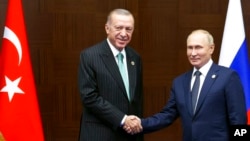Turkish President Recep Tayyip Erdogan met his Russian counterpart, Vladimir Putin, Thursday for the fourth time in as many months. The frequent meetings and close ties are fueling concerns among Turkey’s Western allies that Ankara is circumventing sanctions against Russia.
The latest encounter was in Astana on the sidelines of the summit of the Conference on Interaction and Confidence Building Measures in Asia.
Speaking to reporters after his meeting, Erdogan said he wants to build on the success of the United Nations-brokered deal that allows Ukrainian grain blockaded by Russian naval forces to enter world markets.
Erdogan said Turkey is determined to strengthen and continue the grain exports under the Istanbul agreement and the transfer of Russian grain and fertilizer to less developed countries via Turkey.
Ankara played a pivotal role in assisting the United Nations in brokering the grain deal between Ukraine and Russia, known as the Istanbul agreement. Putin on Thursday criticized the deal's implementation, claiming countries in need are not benefiting from the agreement.
The deal comes up for renewal next month.
Galip Dalay of London’s Chatham House said the Ukrainian grain deal is seen as a vindication by Erdogan of his policy of maintaining close ties with Putin.
“The role Turkey can play is very much contingent upon having a working relationship with Russia,” he said. “The Ukrainian grain deal is one of them. Turkey can play a more humanitarian role down the road or a more diplomatic role. All of them require Turkey to have some sort of functional relationship with Moscow as well.”
Stressing the need to maintain close ties with Moscow, Ankara refuses to enforce western sanctions against Russia. The European Union, in a report this week, strongly criticized Ankara for not enforcing sanctions and warned that European companies could use Turkey to circumvent the restrictions.
Washington has also voiced concern. Such complaints are likely to grow with Putin on Thursday repeating a suggestion to use Turkey as a hub for distributing Russian gas that was originally intended for Europe.
Erdogan has not commented on the proposal.
Senior strategist Timothy Ash of Bluebay Asset Management said Putin is seeking to create divisions among his western adversaries and is finding a willing partner in Erdogan.
“For Putin, the relationship with Turkey is important (because) it's about dividing Europe,” he said. “Turkey is a key NATO member. The more he can pull Erdogan and Turkey away from the West, that's all the better. For Erdogan, he's got elections due by June of next year, and he's got a very difficult balance of payments issue. And he thinks by helping Russia getting around sanctions, he thinks Turkey can earn key balance of payment receipts, and that will help.”
Ankara denies it is sanction-busting. But observers say Erdogan is walking an increasingly fine line by looking to keep close ties with Russia, knowing at the same time that his dealings with Moscow could trigger retaliation from the U.S. and Europe in the form of secondary sanctions.




